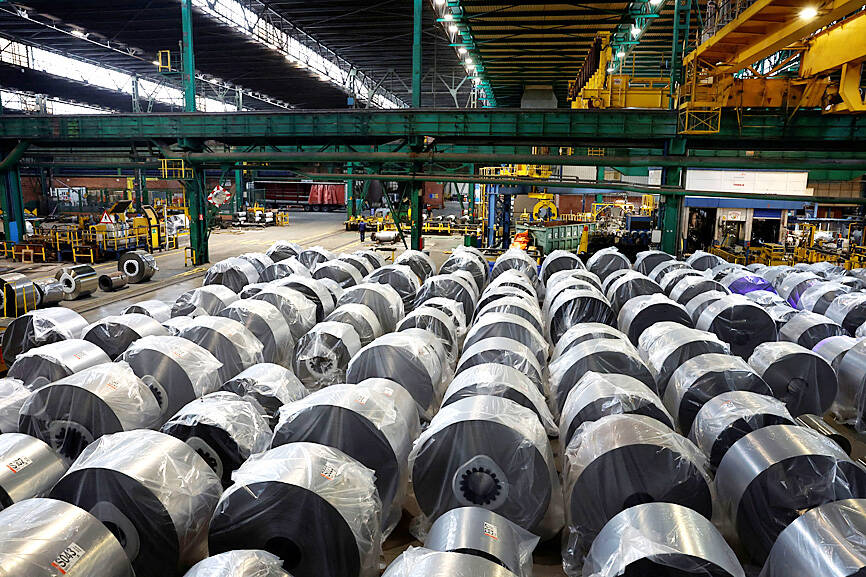China Steel Corp (CSC, 中鋼), Taiwan’s largest steelmaker, yesterday announced that it would keep domestic product prices unchanged for next month to help stabilize the market amid US President Donald Trump’s tariff threats.
The decision follows similar moves by China’s Baowu Steel Group Corp (寶武鋼鐵集), the world’s largest steelmaker, which said it would maintain prices for hot-rolled and cold-rolled plates, while Vietnam’s Formosa Ha Tinh Steel Corp (台塑河靜鋼鐵興業) raised prices for hot-rolled products by US$3 to US$5 per tonne, CSC said in a statement.
Hot-rolled plates are typically used in construction, such as house and bridge building, while cold-rolled steel plates are primarily used in vehicle manufacturing.

Photo: Reuters
Meanwhile, ArcelorMittal SA, Europe’s leading steelmaker, last month announced that it would raise prices for hot-rolled coils by US$22 per tonne, as iron ore and coking coal were persistently trading at high prices, the statement said.
“Considering the uncertain market sentiment for the impact of new US tariffs on our downstream industries, CSC is holding on prices for all products for May to stabilize the market sentiment,” CSC said.
Trump last month invoked Section 232 of the US Trade Expansion Act of 1962 to impose a 25 percent tariff on steel imports, citing national security concerns.
As a result, hot-rolled coil prices in the US have remained above US$1,000 per tonne, CSC said.
In addition, the US administration’s so-called “Liberation Day” 32 percent levy on Taiwanese goods — although postponed by 90 days — has also fueled uncertainty in the market, it added.
“Since some of our downstream customers are negatively affected by the uncertainty of US tariff policies, we will continue to pay attention to the latest developments and roll out support measures to help them secure orders,” CSC said.
If Trump’s 32 percent “reciprocal” tariffs remain in place over the long-term, Taiwan’s GDP growth could be reduced by at least 1.5 percent, putting downward pressure on the current 3.14 percent growth estimate released by the Directorate-General of Budget, Accounting and Statistics in late February, the company added.

WEAKER ACTIVITY: The sharpest deterioration was seen in the electronics and optical components sector, with the production index falling 13.2 points to 44.5 Taiwan’s manufacturing sector last month contracted for a second consecutive month, with the purchasing managers’ index (PMI) slipping to 48, reflecting ongoing caution over trade uncertainties, the Chung-Hua Institution for Economic Research (CIER, 中華經濟研究院) said yesterday. The decline reflects growing caution among companies amid uncertainty surrounding US tariffs, semiconductor duties and automotive import levies, and it is also likely linked to fading front-loading activity, CIER president Lien Hsien-ming (連賢明) said. “Some clients have started shifting orders to Southeast Asian countries where tariff regimes are already clear,” Lien told a news conference. Firms across the supply chain are also lowering stock levels to mitigate

IN THE AIR: While most companies said they were committed to North American operations, some added that production and costs would depend on the outcome of a US trade probe Leading local contract electronics makers Wistron Corp (緯創), Quanta Computer Inc (廣達), Inventec Corp (英業達) and Compal Electronics Inc (仁寶) are to maintain their North American expansion plans, despite Washington’s 20 percent tariff on Taiwanese goods. Wistron said it has long maintained a presence in the US, while distributing production across Taiwan, North America, Southeast Asia and Europe. The company is in talks with customers to align capacity with their site preferences, a company official told the Taipei Times by telephone on Friday. The company is still in talks with clients over who would bear the tariff costs, with the outcome pending further

Six Taiwanese companies, including contract chipmaker Taiwan Semiconductor Manufacturing Co (TSMC, 台積電), made the 2025 Fortune Global 500 list of the world’s largest firms by revenue. In a report published by New York-based Fortune magazine on Tuesday, Hon Hai Precision Industry Co (鴻海精密), also known as Foxconn Technology Group (富士康科技集團), ranked highest among Taiwanese firms, placing 28th with revenue of US$213.69 billion. Up 60 spots from last year, TSMC rose to No. 126 with US$90.16 billion in revenue, followed by Quanta Computer Inc (廣達) at 348th, Pegatron Corp (和碩) at 461st, CPC Corp, Taiwan (台灣中油) at 494th and Wistron Corp (緯創) at

NEGOTIATIONS: Semiconductors play an outsized role in Taiwan’s industrial and economic development and are a major driver of the Taiwan-US trade imbalance With US President Donald Trump threatening to impose tariffs on semiconductors, Taiwan is expected to face a significant challenge, as information and communications technology (ICT) products account for more than 70 percent of its exports to the US, Chung-Hua Institution for Economic Research (CIER, 中華經濟研究院) president Lien Hsien-ming (連賢明) said on Friday. Compared with other countries, semiconductors play a disproportionately large role in Taiwan’s industrial and economic development, Lien said. As the sixth-largest contributor to the US trade deficit, Taiwan recorded a US$73.9 billion trade surplus with the US last year — up from US$47.8 billion in 2023 — driven by strong